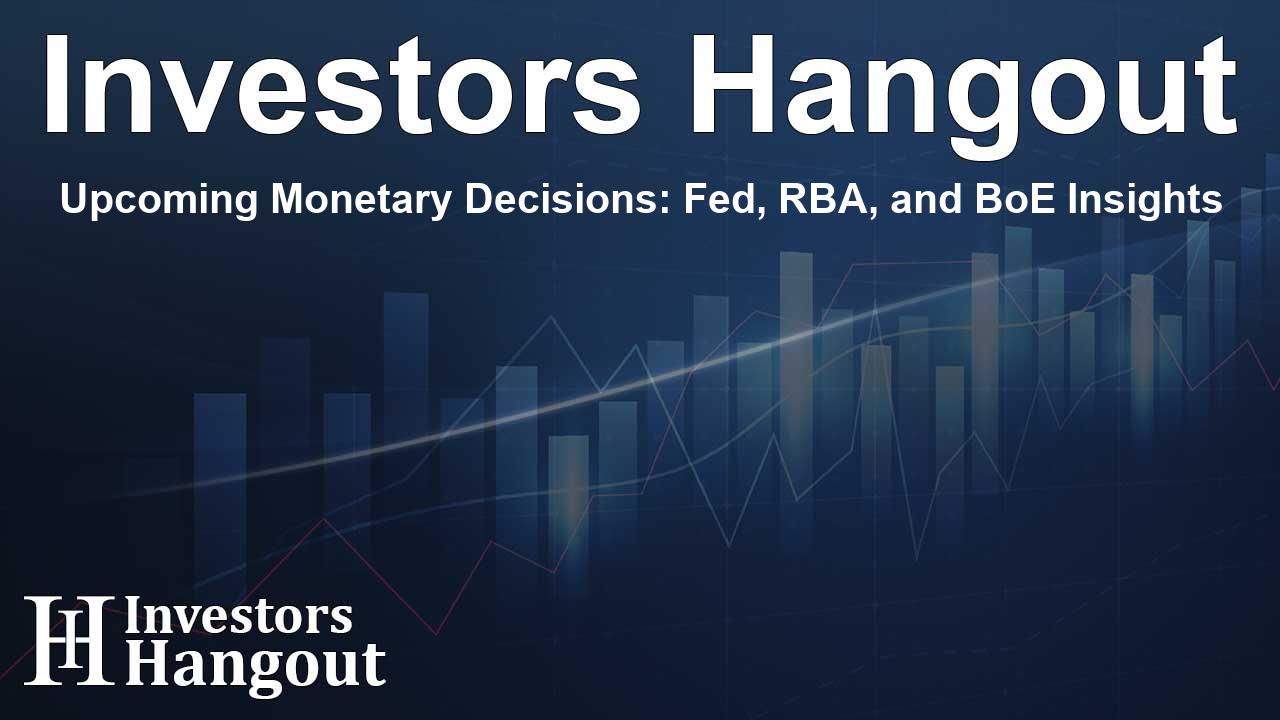Upcoming Monetary Decisions: Fed, RBA, and BoE Insights

Anticipation Surrounding Key Central Bank Meetings
As the US gears up for a crucial election, financial markets remain on high alert. Traders' main focus is set on the upcoming US election, where the results could significantly impact monetary policy decisions. With Donald Trump and Kamala Harris neck and neck, the election outcome is creating a whirlwind of speculation and anticipation.
Recent data has shown the US dollar gaining strength, primarily due to the belief that the Federal Reserve (Fed) will either maintain or marginally adjust interest rates. As the election draws close, market participants are weighing the economic implications of either candidate's victory. Trump's proposed tax cuts and tariffs could lead to inflationary pressures, influencing the Fed's decisions on interest rates in the months to come.
Implications of the Upcoming US Election
The impending election is more than just a political event; it holds significant economic weight. As voters head to the polls, the repercussions of their choices could resonate through financial markets. If Trump wins, speculation could arise about slowed rate cuts, potentially driving US Treasury yields and strengthening the dollar further. Conversely, a Harris victory could generate uncertainty in markets as her economic policies differ significantly from Trump’s.
The performance of the stock market hinges on these outcomes. If Trump secures a win, initial bullish trends might falter as the market grapples with his promises of tariffs and slower rate cuts.
The Fed's Response Post-Election
Central to market anticipations is how the Federal Reserve will respond after the election. Just two days post-election, the Fed is set to announce its monetary policy decisions. Current market sentiment leans towards a cautious reserve; hence, traders are preparing for potential rate cuts in subsequent meetings as the Fed evaluates the new economic landscape.
Analysts are closely watching signs from the Fed about its future direction. Any shifts in economic policy or unexpected changes in rate adjustments could signal deeper market trends. A decision to cut rates could be seen as a response to slowed economic activity, adjusting the monetary environment accordingly.
The Australian and British Central Banks in Focus
Following the Fed's meeting, the central banks of Australia (RBA) and the UK (BoE) are also in the spotlight. Market participants are interested in how these banks will maneuver their monetary policy amidst global uncertainties. On Tuesday, the RBA is expected to maintain its current rates. With inflation still a pressing issue, a continuation of the current strategy may provide stability in the Australian economy.
In contrast, the BoE may be leaning towards rate cuts, given recent data indicating a drop in inflation rates. The BoE's forthcoming decisions will be scrutinized for their potential impacts on the British economy as conditions evolve.
RBA's Strategy Going Forward
At their last meeting, RBA officials decided to hold interest rates steady, focusing on inflation management. As economic conditions fluctuate, the RBA is likely to provide clear signals about their policy trajectory. Investors remain eager to ascertain if rates will remain stable through the end of the year or if incremental changes will occur ahead of expectations for the coming year.
BoE's Potential Rate Movement
Should the BoE decide to cut rates this week, market participants may experience varied reactions. The context of their decision will be crucial; whether it indicates a proactive stance or a reactionary measure in light of fluctuating inflation data. Close attention will be paid to the voting within the committee, which could further steer market sentiment.
Job Markets in New Zealand and Canada
Beyond the key central bank meetings, upcoming employment reports from New Zealand and Canada will also generate interest. Economic health, as suggested by job data, could influence the discussions surrounding monetary policy in these regions.
With employment reports reflecting regions' strengths or vulnerabilities, analysts will be scrutinizing the data for hints on future central bank actions. Weak job figures could prompt discussions on aggressive monetary policy adjustments in both nations.
Frequently Asked Questions
What is the significance of the upcoming US election?
The US election could significantly influence economic policy and market stability, affecting decisions made by the Federal Reserve, RBA, and BoE.
How will the Fed respond after the election?
The Fed's response will depend on the election outcome and economic conditions, with potential rate cuts or holds in light of the situation.
What should we expect from the RBA's upcoming meeting?
The RBA is likely to maintain current interest rates for now, focusing on managing inflation and economic recovery.
Will the BoE implement rate cuts soon?
Market speculation suggests there may be a strong likelihood of rate cuts, contingent upon inflation data and economic health.
What economic indicators are being monitored?
Key indicators include inflation rates, employment data from Canada and New Zealand, and overall consumer confidence as they all impact monetary policy decisions.
About Investors Hangout
Investors Hangout is a leading online stock forum for financial discussion and learning, offering a wide range of free tools and resources. It draws in traders of all levels, who exchange market knowledge, investigate trading tactics, and keep an eye on industry developments in real time. Featuring financial articles, stock message boards, quotes, charts, company profiles, and live news updates. Through cooperative learning and a wealth of informational resources, it helps users from novices creating their first portfolios to experts honing their techniques. Join Investors Hangout today: https://investorshangout.com/
Disclaimer: The content of this article is solely for general informational purposes only; it does not represent legal, financial, or investment advice. Investors Hangout does not offer financial advice; the author is not a licensed financial advisor. Consult a qualified advisor before making any financial or investment decisions based on this article. The author's interpretation of publicly available data shapes the opinions presented here; as a result, they should not be taken as advice to purchase, sell, or hold any securities mentioned or any other investments. The author does not guarantee the accuracy, completeness, or timeliness of any material, providing it "as is." Information and market conditions may change; past performance is not indicative of future outcomes. If any of the material offered here is inaccurate, please contact us for corrections.









